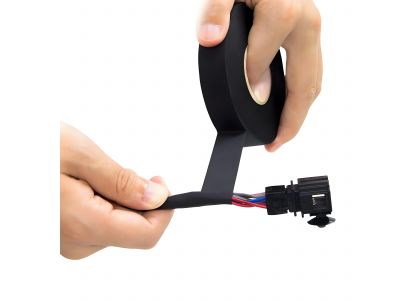
When it comes to maintaining the integrity and safety of electrical systems, understanding the compatibility of wiring loom tape with various materials is critical. Whether using adhesive wire loom wrap or cloth wiring harness tape, ensuring these materials work effectively with plastics, metals, and insulation is vital for both industrial and automotive wiring harness tape applications.
This guide explores how wiring loom tapes interact with different surfaces and how to choose the right type for your project.
Wiring loom tape serves to bundle, protect, and insulate electrical wires and cables. It comes in various forms, including:
Adhesive Wire Loom Wrap: Provides a sticky layer for secure bundling and environmental protection.
Cloth Wiring Harness Tape: Typically non-adhesive, offering flexibility, abrasion resistance, and a neat appearance, commonly used in automotive applications.
Selecting the correct tape ensures reliable insulation and organizational efficiency in complex wiring setups.
Plastics like PVC and polyethylene are common in cable insulation. The compatibility of wiring loom tape with these materials affects performance:
PVC Compatibility: Adhesive wiring loom tapes adhere well to PVC without causing degradation.
Polyethylene Compatibility: Non-adhesive wraps often made of polyethylene themselves are fully compatible, ensuring interchangeability without material conflict.
Electrical systems frequently incorporate metal components such as copper, aluminum, and galvanized steel.
Copper and Aluminum: Adhesive wire loom wrap should be carefully chosen to avoid corrosion risks. Non-adhesive options like cloth wiring harness tape reduce potential chemical interactions.
Galvanized Steel: In automotive applications, using non-corrosive automotive wiring harness tape preserves the integrity of steel surfaces.
Many electrical wires are additionally insulated with rubber or foam.
Rubber Insulations: Most wiring loom tapes are engineered to be compatible with rubber, ensuring secure bundling without degrading insulation quality.
Foam Insulations: Care is needed—solvent-based adhesives can deteriorate foam materials. Here, cloth wiring harness tape is often preferable to maintain insulation integrity.
In the automotive sector, automotive wiring harness tape must endure extreme conditions, such as:
High Temperatures: Engines and exhaust systems generate intense heat; thermal-resistant cloth tapes are essential.
Moisture and Chemical Exposure: Automotive environments demand tapes resistant to oil, water, and road chemicals.
Vibration and Flexibility: Cloth wiring harness tapes provide flexibility without compromising hold, critical for moving vehicle components.
Choosing the right tape here enhances vehicle durability, electrical reliability, and ease of maintenance.
| Material Type | Recommended Tape | Notes |
|---|---|---|
| PVC | Adhesive Wire Loom Wrap | Excellent adhesion without damage |
| Polyethylene | Non-Adhesive Loom Wrap | Fully compatible, flexible use |
| Copper/Aluminum | Cloth Wiring Harness Tape | Reduces corrosion risk |
| Galvanized Steel | Automotive Wiring Harness Tape | Maintains protective coatings |
| Rubber Insulation | Wiring Loom Tape (Rubber-safe adhesive) | Secure bundling without degradation |
| Foam Insulation | Cloth Wiring Harness Tape | Solvent-free to prevent material damage |
Q1: When should I choose adhesive wire loom wrap over cloth wiring harness tape?
Use adhesive wire loom wrap for environments requiring tight bundling and moisture protection; use cloth wiring harness tape for flexibility and minimal surface impact.
Q2: Is automotive wiring harness tape different from general wiring loom tape?
Yes. Automotive wiring harness tape is designed for higher heat, chemical exposure, and vibration resistance, making it suitable for demanding vehicle environments.
Q3: Can wiring loom tape degrade other insulation materials?
Only if using incompatible adhesives. Always select solvent-free tapes for foam and rubber materials to prevent degradation.
Selecting the appropriate wiring loom tape is crucial for maximizing compatibility, performance, and longevity. By understanding how adhesive wire loom wrap, cloth wiring harness tape, and automotive wiring harness tape interact with different materials, you can confidently ensure the safety and durability of electrical systems across industrial and automotive applications.
For every wiring project, whether safeguarding vehicle harnesses or organizing complex industrial panels, choosing the correct tape ensures long-lasting reliability and operational efficiency.